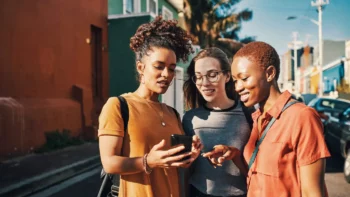
Molly-Mae and Elle Darby | What Does the Future Look Like for the Influencer-Gen Z Relationship?
Voxburner Content Team
Article Highlights
- Molly-Mae - What happened?
- Elle Darby - What happened?
- So what does this mean for influencers?
- Cancel culture versus. holding someone accountable
- How does this impact your brand’s marketing?
Be the first to access new posts and exclusive content
Unless you’re not on Twitter, Instagram, YouTube or just the entire internet, then you’ll be aware of the recent Molly-Mae and Ella Darby scandals. The influencers have both come under fire over the past week for comments they’ve made, either presently or in the past, and Gen Z has been holding them to account. These situations, which we’ll explore in more detail below, begs the questions: do Gen Z need/want influencers in their lives? And what place do influencers have in society as we head into 2022 and the third year of the Covid-19 pandemic?
Molly-Mae – What happened?
Following her recent appearance on Steven Bartlett’s podcast Diary of a CEO, in which she spoke about her career and position as Creative Director of fast-fashion brand Pretty Little Thing, Molly-Mae commented: “I understand we all have different backgrounds and we’re all raised in different ways and we do have different financial situations, but I think if you want something enough you can achieve it. It just depends on what lengths you want to go to get where you want to be in the future. And I’ll go to any length. I’ve worked my absolute arse off to get where I am now.” These remarks have come under fire from Gen Zers and millenials across the internet, who are criticising the influencer for not acknowledging the privilege of being a white, straight, middle-class, able-bodied woman from a wealthy background, as well as for implying that anyone who doesn’t achieve everything they desire is lazy. As The Tab wrote, ‘Nothing grates on me more than influencers who spout nonsense and say hard work makes you rich because that demonises poor people and makes them seem lazy.’
As we know, Gen Z demands equality and equal opportunity, and are big on recognising and acknowledging their privilege… and unfortunately, Molly-Mae didn’t do this here. After all, her remarks have ‘…stirred up more continued criticism of influencer culture as a whole, with many criticising Molly-Mae’s claim of “working her arse off” being completely out of touch and not reflective of the hard wok of those in a less privileged position than her – who didn’t get huge brand deals after being on one of the biggest TV shows in the country.’ The influencer previously faced issues when she was appointed Creative Director at Pretty Little Thing last year, with hundreds of people criticising her for being ‘given’ the position and not working for it. Since then, the influencer seems to have bounced back, although this recent scandal just proves that Gen Z is always ready to hold people accountable and do the right thing.
Elle Darby – What happened?
Another lifestyle influencer, Elle Darby, recently came under fire when some old tweets from 2011 recirculated, in which the influencer made discriminatory and offensive comments which contained racist, homophobic and fatphobic language. Her fiance, Connor Swift, has also been accused of the same thing. Darby has since released an apology video, which has been also slammed on the internet for being insincere. The influencers have both lost thousands of followers as a result.
Gen Zers are, rightly so, appalled by the tweets. And whilst these social media posts were from over 10 years ago, it just proves that you, whether an individual or brand, are at risk of being scrutinized by the generation. As long as it’s online, it’s public, and if it’s bad, they’ll find it. With this in mind, it’s important that you really do your research on any influencers that you may want to collaborate with in order to eliminate any risk of controversial material recirculating (we discussed this in-depth in our latest Voxburner+ report, Supercharge Your Gen Z Marketing For 2022), as not only does it risk offending your consumers and wider audiences, but it may damage your brand reputation.
So what does this mean for influencers?
With both of these incidents happening within a similar time frame, combined with the fact that Gen Z expects honesty, equality and diversity, it’s plausible to suggest that the generation are maybe starting to move away from lifestyle influencers (ie. those who are not tied to any particular cause or passion). 74% of Gen Z describe themselves as activists (US Youth Trends Report 2021) and are consequently more likely to expect influencers to also have strong morals and values. Gen Z knows that success doesn’t come from beauty and wealth, and are holding those influencers who suggest so accountable, meaning that over time their presence may decrease. So yes, influencers are still a valuable marketing tool, but it’s more important now than ever before that you do your research and select the right figure for your brand.
Cancel culture versus. holding someone accountable
Having said all of this, it’s important to remember that there is a difference between holding people accountable and cancel culture (something that Gen Z has previously dismissed but seems to be on the rise again). We need to take a step back and look at some of the comments that have arisen from these situations and ask if the line between holding someone accountable (useful, educational and important) and cancelling someone (downright damaging) has been crossed.
With mental health being more important than ever before, it’s vital that we look out for people (and others who have been through similar experiences – think the recent Jesy Nelson scandal) and approach these things in the correct way. The majority of Gen Z are doing this by educating others on the mistakes of these influencers, forcing them to acknowledge and apologise for their mistakes and hopefully paving the way for a brighter future, but there are, of course, some that are taking the trolling approach. The cancel culture versus holding accountable debate is a topic that could be explored in-depth, but, for now, it’s important to just be aware of the difference.
How does this impact your brand’s marketing?
We don’t think lifestyle influencers are necessarily on their way out, we just think that Gen Z is beginning to become a lot more critical and intolerant of them, as they want influencers that either promote or support a cause (climate change, diversity, period poverty) or are unproblematic and lowkey (small-time, wholesome influencers or studytubers). As The Tab put it, “It’s time influencer culture came to an end. We’re now entering our third year of the pandemic and influencers have made it painfully clear that there’s no equality between us and them.”
So, if you want to use influencers in your marketing strategies for 2022, make sure you research them and think carefully about who they are and the decisions they make – just because they’re a big name right now doesn’t mean that something won’t happen in the future.
Want more content like this? Subscribe to Voxburner+ for access to exclusive reports, webinars, and more, and sign up for our newsletter here.
[Cover image 📷: @mollymae on Instagram]



